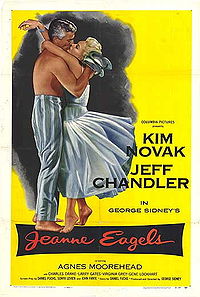
JEANNE EAGELS
US, 1957, 108 minutes, Black and white.
Kim Novak, Jeff Chandler, Charles Drake, Agnes Moorehead, Larry Gates, Virginia Grey, Jean Lockhart, Murray Hamilton.
Directed by George Sidney.
Jeanne Eagels is based on the life of the famous, in her time, actress of stage and screen, Jeanne Eagels. Here she is portrayed by Kim Novak, at the beginning of her career and having made a success of such films as Picnic and Five Against the House. She was to appear the next year in Hitchcock’s Vertigo.
The film has fictionalised much of Jeanne Eagels’ actual life and career. She was born in 1890 and died in 1929 of a drug overdose. She was very temperamental but made a success of her career on stage in the theatrical version of W. Somerset Maugham’s Rain (filmed in 1929 with Gloria Swanson, then with Joan Crawford and, later, Rita Hayworth). She also received very strong reviews for her performances in the film version of Somerset Maugham’s The Letter (later filmed with Bette Davis and in a telemovie with Lee Remick).
The film stars Jeff Chandler as a carnival entrepreneur, an amalgam of several of the men in Jeanne Eagels’ real life.
The film is a Hollywood biopic about the collapse of a star, a female variation of A Star Is Born. But, in her machinations against an older actress, played by Virginia Grey, she is very much in the vein of All About Eve.
The film shows life in the theatre in the early part of the 20th century as well as early film-making. A solid cast of veteran character actors is in support.
The film was directed by George Sidney who had some fame from the mid-40s to the mid-50s as one of the key directors of musicals at MGM including The Harvey Girls, Showboat, Jupiter’s Darling. He was later to make the musicals Bye Bye Birdie and Half a Sixpence.
1. The quality of this film as biography? Audience interest in the subject, without knowledge of her? The impact of her personality and career of Jeanne Eagels? Kim Novak's adequacy in the role?
2. The use of black and white photography, the world of the sideshow, New York, the theatre and its atmosphere, Hollywood and the early -films? An authentic world in which to understand the personality and career of Jeanne Eagles? What kind of world did she live in, real, fantasy?
3. How interesting a study of a career, opportunities, ambitions, cruelty and betrayals, failure and success, decay? Trace the events in Jeanne’s life, the point where she could have changed the direction of her life and career?
4. The film as a study of success and failure? What were the elements of success in Jeanne’s personality, career and opportunities? What were the main elements of failure? 'Where did they manifest themselves most?
5. Comment on the personality and star quality of Jeanne Eagels: seeing her at the beginning of her career, her starting show business, her work in the sideshow, her push and ambition, her confronting of Madam Neilson,
her capacity for lying, for contriving situations with theatrical people, of stepping, over people, even being responsible for their death, the success and achievement in the performances of Rain, her film career?
6. The personality of Jeanne, her self-reliance, her capacity for love, her relationship with John Donahue? why couldn't she remain intimate with people? Why did she go off by herself, for years? The support of Nellie Neilson? The guilt conscience, drugs and drink?
7. How well delineated was the character of Sal Satoril? His early work on the sideshow, the fact that he remained always a sideshow man? His love for Jeanne and his support of her? His reaction to being used? His love, his being hurt? His observing of her ups and downs? The years passing and her not acknowledging him? a credible character?
8. The contrast with Madam Neilson? Her belief in herself, the arrogance of her training, her tutoring of Jeanne, her support and managing of her?
9. The contrast with John Donahue and his world? Jeanne trying to belong to this world and failing?
10. The atmosphere of the theatre, the playwrights, the producers, the people that worked in the theatre itself? Their effect on her, her reactions to them? Their sense of achievement?
11. The importance of the sequence with Elsie Desmond? The image of what Jeanne could have been like? hysteria, ambition, failure, contriving death? A foreshadowing of what Jeanne Eagels would be like?
12. The transition to the haunted, guilt-ridden person, failing in love and relationships, consumed by ambition, leading only to death?
13. How melodramatic was the treatment, appropriately? How much insight in this cinema biography?